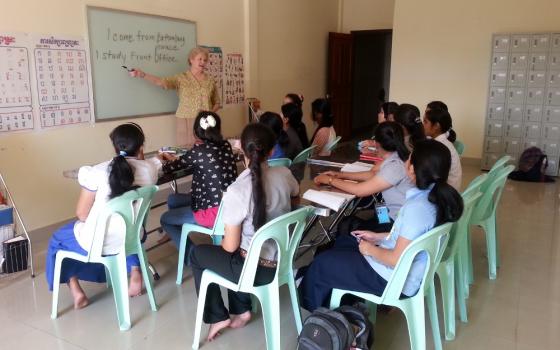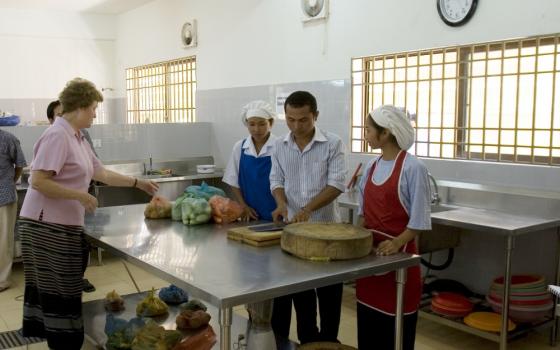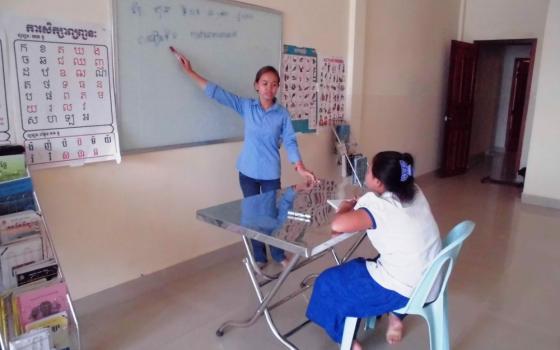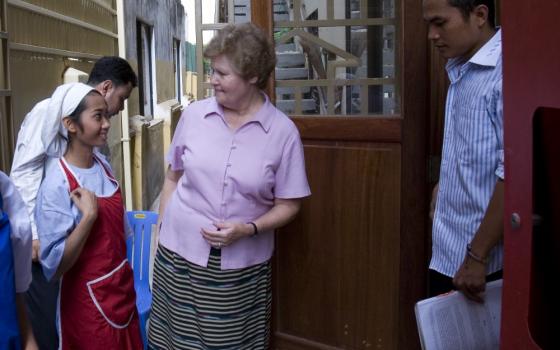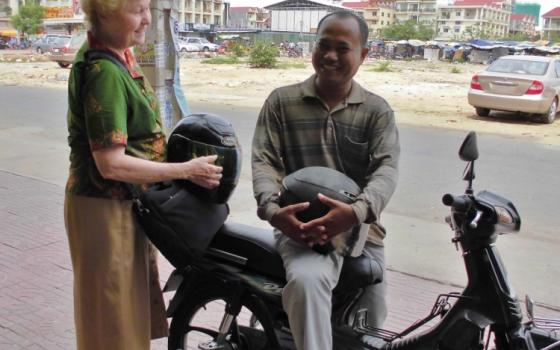Maryknoll Sr. Helene O'Sullivan has seen a lot. Drug-wasted women sleeping under bridges and in public bathrooms in Hong Kong. A 25 year-old left dead in the gutter after an overdose. “Why do you bother with this trash?” the director of the funeral parlor had scolded when the Maryknoll sisters arranged a burial for the woman that no one attended.
But the worst case, by far, was the woman from Poipet. Every time, she had tried to leave the Cambodian brothel where she was imprisoned, the owner beat her and pulled out a tooth with pliers. One extraction per attempted escape beginning with the molars. By the time the woman reached the shelter in the Cambodian capital of Phnomh Penh where O'Sullivan worked, she was toothless.
The 70-year-old nun from Manhattan has devoted much of her life to empowering poor women through education. Since 1991, she has focused on women and girls trafficked in the sex trade. “No man is going to grow old with his prostitute,” she says. The demand for prostitution requires trafficking, and it is poor, young women, lacking economic opportunity, who are “fed into the prostitution machine.”
Last fall, O'Sullivan launched a program in Phnomh Penh that provides basic education and intensive job training for formerly trafficked women and girls. O'Sullivan wants “none of this pink-collar stuff” for her graduates. No hawking vegetables in the market or shampooing hair in male-owned barber shops or working in factories where the higher wages always go to the men.
Cambodia's tourism industry is booming, and her students, regarded as “trash” in their own communities, are aiming to get a piece of the economic pie earning reliably good wages as front desk receptionists and housekeepers in the international hotels that are cropping up all over the capital.
“Jobs at the market or in a small shop or a beauty salon won't give these women enough to live on and send home money to their families. We need to think high-end. Formal sector,” O'Sullivan says later repeating that last detail to emphasize she is settling for nothing less. “Formal sector.”
Small, but ambitious, the Phnomh Penh program is one nun's act of economic sabotage against a multi-billion dollar industry whose “raw material” is impoverished women and children marketed for sex.
Human trafficking is the fastest growing criminal industry in the world, according to the U.S. Department of Health and Human Services. It's tied for second place with arms trafficking, behind the trafficking of drugs. Only here, the commodities are human beings, 87 percent of whom are trafficked for commercial sex, the majority being women and children. UNICEF estimates that in Asia alone, 30 million women and children have been trafficked for sexual exploitation in the past 30 years.
In Cambodia, sex trafficking is a relatively new phenomenon, its increase due to a number of factors including poverty, a lack of employment and education, socio-economic imbalance between rural and urban areas, and, ironically, development. The country's rise in tourism has meant more men with disposable income to spend at men's clubs and karaoke bars that often front for brothels.
For poor Cambodian women and their families, prostitution, or “sex work” has become a means of economic survival. After losing their jobs in the garment industry during the economic downturn in 2009, many women took up prostitution. To cover the cost of a medical bill or repay a debt, families sometimes sell their daughter's virginity or send her to a brothel. The latter practice known as “debt bondage” requires the woman, who is not compensated, to stay at the brothel until the family loan is repaid.
“There is no bigger problem than money,” an impoverished Phnomh Penh mother, who had sold her daughter, recently explained to a CNN reporter.
A place to learn
Last October, O'Sullivan opened Horizons Vocational Training Institute for sex-trafficked and at-risk women. The two-year residential program uses a unique, skills-based curriculum developed by the Australian government as part of the Association of South East Asian Nations (ASEAN) Mutual Recognition Agreement (MRA). Hoping to become a competitive economic block like the European Union, ASEAN's ten member countries have initiated agreements to lower trade barriers and facilitate intra-state employment.
The curriculum, created to standardize hotel and tourism service throughout the region, requires two six-month sessions of study, a practicum and an internship at an international hotel. Upon completion, a woman is certified to work in the hotel industry in any ASEAN countries. Her name goes into an official database so her qualifications can be verified anywhere in the region.
O'Sullivan's students can choose from one of the following areas of focus: reception/front office; waitress, cashier and catering; cooks assistant and buffet set-up; or housekeeping and hotel laundry. They attend hotel classes at Pour un Sourire d'Enfant, a French non-governmental organization with a vocational school that teaches the Australian program.
Because many trafficked women come from poor rural communities where schooling is minimal, Horizons supplements the hotel study with courses in basic education – math, science, reading and English, which O'Sullivan teaches.
“If a student has only completed two or three years of grade school, we teach her at the hostel for three months so she can pass the grade-six exam,” she said. The woman then goes on to study for a grade-nine equivalency certificate, cramming three grades of education into six months. O'Sullivan said Horizons is committed to working with a student until she can pass her exams.
“The time back in school makes [the women] feel more ready for vocational training. A lot of these are public jobs with high standards. We want them in international hotels,” O'Sullivan said.
The pay-off for all this study is significant: Front desk receptionists and housekeepers earn U.S. $150 per month, a very good salary by Cambodian standards. Housekeeping can bring in more with tips. By contrast, the Cambodia Institute of Development Study puts the average wage of a garment worker at $67 per month. A PowerPoint slide presentation by O'Sullivan on trafficking reports that a sex worker, working from 5 p.m. to 3 a.m. at Phnomh Penh's Candy and Sizzlers Bar Restaurant and Guesthouse, makes $60 per month, which is not much in a city where it can cost $1.25 a day to eat.
By O'Sullivan's telling, the achievements of Horizon's first group of students are impressive. Six, who entered with a grade-six education, just passed their grade-nine equivalency exam, after months of night cramming. They created digital slide presentations on the Cambodian hotel industry within four months of their arrival and are now doing internships as front desk receptionists at an international hotel. One student was offered a job at the hotel where she did her practicum, but she is completing certification to improve her career options. Horizon's ample residency period and one-on-one instruction allows a woman time – a luxury for the poor-to develop job options.
The institute, which currently has 25 students, with 20 more waiting to get in, anticipates a total enrollment of 50 by next year. The women are referred from shelters. O'Sullivan attributes the school's initial success to its small class size and highly motivated students. “I tell you, they are a joy to teach, she said. “I leave the hostel every night dancing.”
The path to Horizons
The nun said she had no desire to start an NGO at age 70. But she was determined to procure high-end job-training for sex-trafficked women. In many respects, Horizon represents her own evolution working every phase of their assistance – recovery, rehabilitation, reintegration. In the early ‘90s, she co-directed an outreach program for women involved in prostitution that took her into the brothels of Hong Kong. She offered AIDS education, provided legal assistance, visited women in prisons and in their homes.
In Cambodia, O'Sullivan focused on job-training, serving as project manager of a $500,000 grant the U.S. Department of Labor awarded to the NGO Hagar to help trafficked women attain a sustainable livelihood. She teamed up with Frank Woods, an Australian entrepreneur willing to hire formerly trafficked women for his catering business feeding hotel employees.
“He was just brilliant. He would get all these contracts, and he really delivered.” O'Sullivan said. She developed My New Work Life, a curriculum to teach soft-skills that uses techniques she learned while pursuing a master’s in adult education at Columbia University.
“Many of the women were from rural areas. They were being trained to work in the formal sector but had little knowledge of what this entailed – to be at work on time, to take responsibility for everything in your work area. They might have sold vegetables in the market, but when the vegetables are sold, they go home. You can't do that in the formal sector.” O'Sullivan said. My New Work Life is now used in vocational programs throughout Cambodia.
At the Phnomh Penh office of the Cambodia Women Crisis Center, O'Sullivan oversaw vocational training. The center operates a network of shelters throughout the country for survivors of rape and trafficking. In addition to providing healthcare and psycho-social support to assist with the emotional recovery from abuse, the shelters tried to do vocational training; but it was never for high-end jobs, she said. “You can't do everything in a shelter.”
Holding their heads up high
Financial insecurity is a persistent difficulty for sex-trafficking survivors re-integrating into society. Joblessness and stigma await them, if they return to their home village, O'Sullivan said. Their only option is to try to survive in the city where rents are high and wages low for the unskilled. The Butterfly Longitudinal Research Project, a 10-year study of re-integration for survivors of sexual exploitation in Cambodia, reported that from 2011 to 2013 only 20 percent of project participants said they strongly agreed with the statement: “I do not earn enough money by working at my main job alone.”
Most vocational programs in Phnomh Penh require a high school diploma, something many trafficked women do not have, O'Sullivan said. The Australian curriculum has no such prerequisite. To be certified, a woman need only demonstrate her mastery of designated skills. The ASEAN certification brings more than an increase in earning power. It provides a trafficked woman an opportunity to restore her dignity and her honor which is understood in Cambodia as a collective virtue.
“There is a strong cult of virginity here,” O'Sullivan said. “The women feel that if it is known they have been trafficked, there is a stigma. You have lost honor for yourself and your family. How do you regain that? Get more education and get a really good job to support your family. Because it is not your honor, it is the family's honor. And they interpret the family's honor as the family being able to take of its own members.”
Women are often trafficked or go into prostitution to help the family. So it is very important to help them redeem their honor, to give them a “job where they can really hold their head up high,” she said.
Horizons is a “small experiment,” O'Sullivan said, one she hopes the Cambodian government will be convinced of its value: investment in catch-up education for poor, vulnerable girls, because “these kids deserve it.”
She knows a two-year vocational program is ambitious. Maybe specialized institutes are needed. But high-end jobs have to be the goal. Like her colleagues in the anti-trafficking community she thinks eradicating trafficking requires confronting the demand for prostitution. Meanwhile, training poor women for jobs in the formal sector will undercut supply.
And does she ever think that if it weren't for Horizons, her students might endure a fate like the toothless woman from Poipet? O'Sullivan won't make such derogatory predictions. Her students read on the Internet now. “Let's just say, they are going to have a fabulous life,” she said.
[Claire Schaeffer-Duffy is a longtime NCR contributor who lives and works at the Sts. Francis and Therese Catholic Worker Community in Worcester, Mass.]
